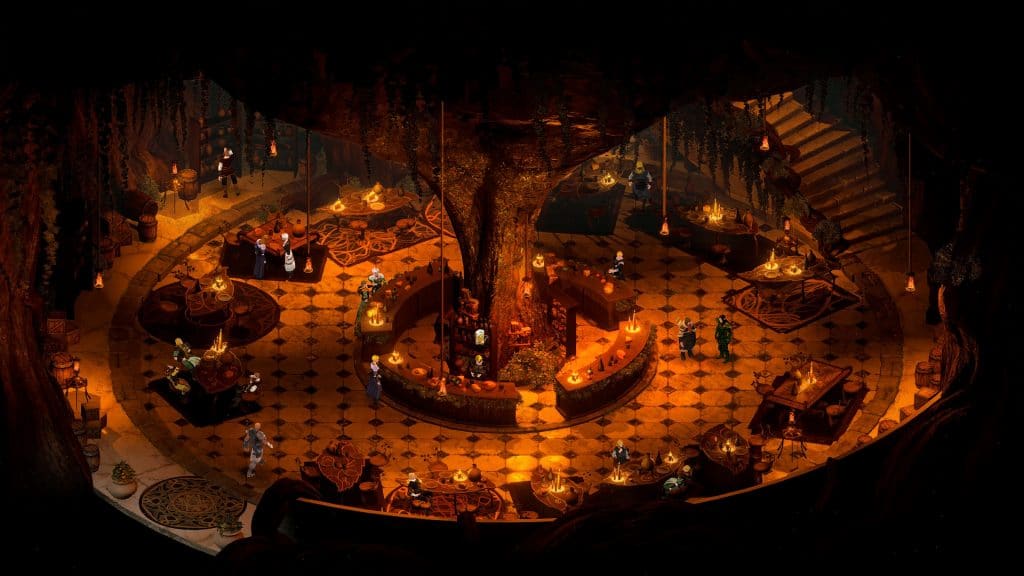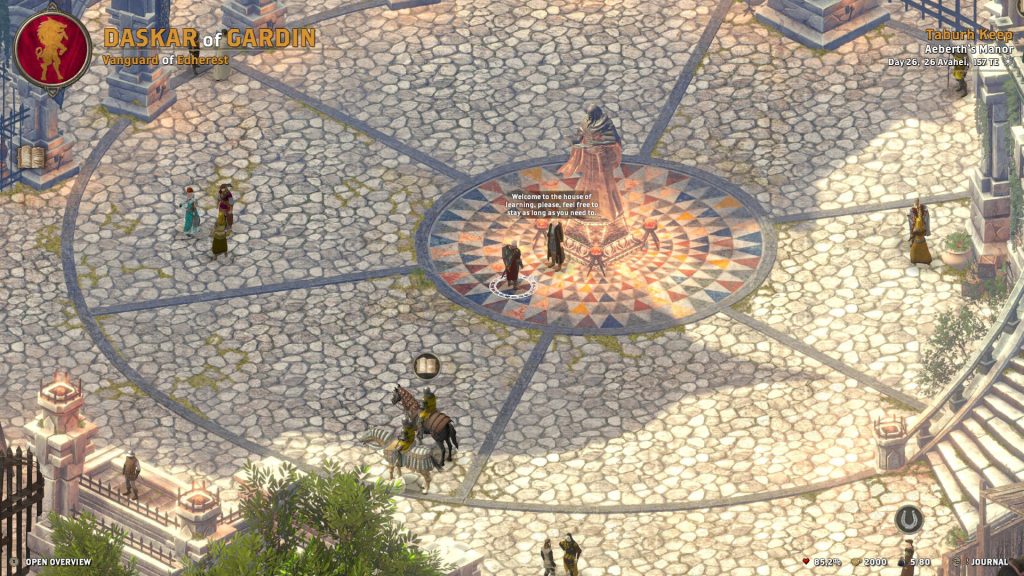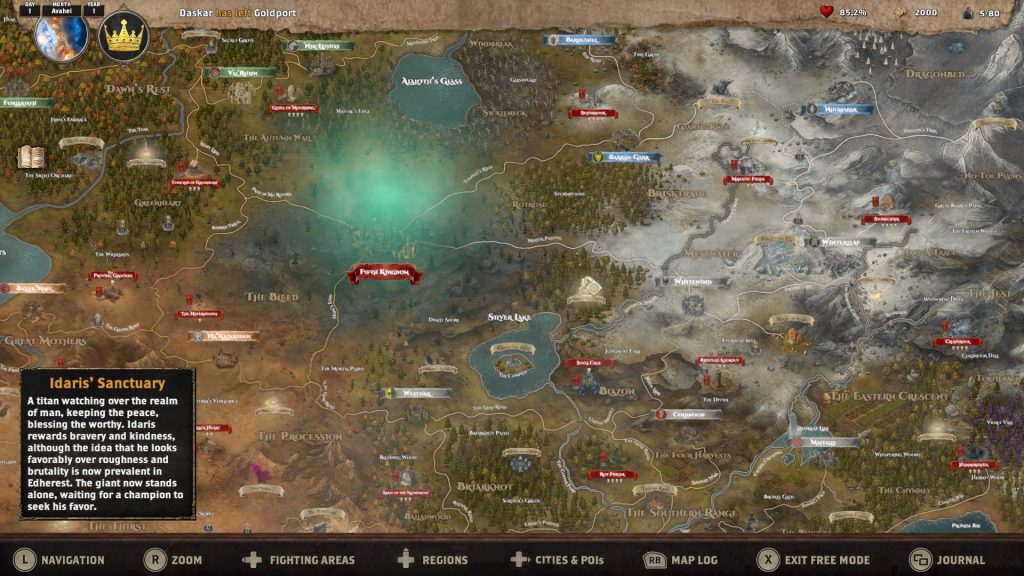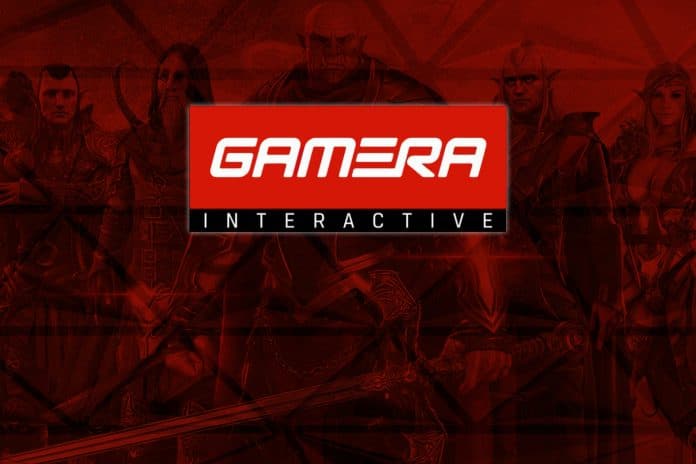Isometric fantasy RPG game Alaloth: Champions Of The Four Kingdoms is due to be unleashed upon the world in early access at the end of this month. That’s why we felt there was no better time to interview the producer of Gamera Interactive, Giulia Zamboni, about the game.
We spoke to Giulia about what a video games producer does, the kind of development cycle Alaloth has had, and loads of other juicy topics. So sharpen your sword, cast a strengthening spell on your armor, and let’s begin our quest into one of the minds of the Gamera Interactive team!
PCZ: Hi Giulia, how are you?
Giulia: I’m great, thanks!
PCZ: Great. Could you start by telling us your name, role, and where you’re calling from today?
Giulia: Hi, I’m Giulia Zamboni. I’m speaking from Padova in Italy today, where it’s very hot. And I’m the producer for Gamera Interactive. We are currently working on Alaloth: Champions Of The Four Kingdoms.
PCZ: What do you think about the first Starfield gameplay trailer released recently, and what other games have caught your eye in the summer announcements?
Giulia: I’m not a massive fan of space games, but Starfield is a game that goes beyond personal preferences. From my perspective as a producer, it must be crazy to support people within such a huge project. Finally, we have a date for Starfield, which is exciting.
What we have seen about Starfield is amazing, and I can’t wait to see more. My favorite type of game is small, indie projects due to the unique style and innovative gameplay.

I like Naiad, a vivid and quite relaxing game where you play a water spirit swimming and helping water life, and another game that is tiny but I found super cool. It is called Time Flies, about the life cycle of a fly.
I am more attracted to projects that the media is not constantly bombarding us with. I am also super excited about Pentiment from Obsidian, a game by Josh Sawyer. I was so excited to see it, and I want to play it, as I am really into historic worlds.
PCZ: Yeah, there are so many exciting games to watch this summer. We are excited for Cult Of The Lamb, amongst loads of others. So, could you tell us exactly what a games producer does?
Giulia: Haha, that’s a tough one to answer. My main duties are to organize and supervise the entire team daily. I also maintain a broad, long-term overview of our production schedule.
What I do on the ground is regularly liaise with the team and try to help them stay on track. On-time and budget! On a smaller scale, I usually have to do lots of micro-tasking to develop ideas to create what we want to create and achieve our goals.
PCZ: Could you give us a summary of what Alaloth is for those who don’t know?
Giulia: Haha, it might be easiest to talk about what it is not. What we wanted to do from the beginning was make Alaloth a game between two genres. Older RPGs with modern gameplay.
We wanted to attract players from these two different styles of RPG games. If you are the type of player who likes a narrative-focused, lore-rich level of immersion, we have a whole world built from scratch for Alaloth. But if you prefer to go directly to killing enemies, you can also do that with the deep and intuitive combat system of Alaloth.
This balance means we cater to every player and don’t force a particular play style on anyone. We have also tried to create something beautiful to see. When we first started designing the game, we had many games we wanted to use as references. There are also lots of references to cult games of the past.
PCZ: Okay, what games that people have already played will people feel are similar to Alaloth?
Giulia: We increased our references list due to these comments from fans. One of the first games we felt influenced by was Moon Stone. This game is very old and was on the Amiga console, allowing four different character choices with a classic world map divided into four sections.
We also liked RPG games a lot, so we had in mind games like Pillars Of Eternity and Divinity: Original Sin. Most, if not all, previous RPGs had some influence on forming various aspects of Alaloth. Many fans likened the first Alaloth trailer to Diablo.
We are thrilled to have parallels with such a huge game but want to remind players that Alaloth will be a very different experience from Diablo despite some broad similarities. The other thing to add is that our main aim was to bring some typical trading mechanics into an isometric game.
We also have very detailed environments, which we are super proud of. That’s what we want the Alaloth experience to provide for players.
PCZ: It’s interesting because any studio making a game wants to make something fresh and new. So the experience of making a modern gaming experience with old-school references and world-building must be a tricky balance.
Giulia: Yes, it is not easy. We are a small team of 20 people, so we do our best to provide the most detailed but engaging and accessible experience for today’s gamers. We have also had different challenges, haha!
During the pandemic, issues occurred, and that was more difficult for a small team. But because of our small size, we are incredibly honored to be compared with bigger games with teams of hundreds, so that gives us a great sense of pride in what we have achieved with Alaloth.
PCZ: How long has it taken to make Alaloth?
Giulia: To be honest, aside from Covid, we had many challenges for the company from the beginning. The development cycle was about two and a half years.
PCZ: Can you tell me a bit more about the cities of Alaloth?
Giulia: The cities in Alaloth? What do you want to know?
PCZ: I found it interesting to learn that each city is self-contained and that based on the player character’s race, they will be treated differently by NPCs. I also thought it cool that you could only buy certain types of armor and other items in specific cities, so elven armor only in the elven city, for example.
Giulia: Ah, okay, yeah. I would start by saying that we followed four very different art directions for the four races. We have humans, orcs, dwarves, and elves. We put a lot of love into each environment.
Cities in Alaloth are hubs where you can find whatever you want in a medieval city. There are vendors, taverns, and throne rooms; under different conditions, you can be received by the king or queen of the kingdom. The way NPCs interact with you will be different depending on your race.
Because of the richness of the lore, there will be different situations and conversations that you will experience and different quests depending on race.

PCZ: What makes the combat of Alaloth different from other RPGs?
Giulia: It has soulslike elements, which means you must be very good with your control peripherals, be it mouse and keyboard or console gamepad.
You have to be skilled if you want to survive. You start as a basic knight and then make decisions about specializing in specific skills in the skill tree. That is a way Alaloth is not like Diablo, in that it can be easy to ignore strategy and skill and end up dead at the hands of a very low-level mob.
PCZ: What makes the combat the opposite of a hack and slash?
Giulia: First, there is a weight cap for the inventory, and you cannot access your inventory when entering combat arenas. The weight limit means that you have to decide on the equipment you will be using carefully. Every fighting area is filled with mobs that will not behave in a Diablo style way.
Instead of having hordes of enemies, we have smaller groups of more challenging enemies, so you will have to parry, defend and attack your way out of such situations strategically to get out alive.
PCZ: I am aware you experienced various challenges making the game. Could you tell us about those?
Giulia: We faced a lot of different things. From my point of view, as a producer, I am in charge of planning things. I have to think of plans A and B, but I don’t think any producer in the world could have planned for Covid-19.
Our first physical studio was flooded with lots of damage as all our computer equipment was on the first floor. We lost some but not all the content we had created up to that point. Before the pandemic in 2019, I lost my father in a mountaineering accident. He was one of the co-founders of Gamera and a huge inspiration for our vision.
Such things make you think about what’s important in life and whether you want to go on with a project. But my father would have wanted us to continue since we got so far, so that’s what we did! Right in the middle of Covid, we got hit with a sudden studio relocation and had parts of the team in the middle of their relocation.
We found ourselves stuck in the Covid-19 pandemic trying to move staff to the studio. So most of us have been working remotely from March 2020. We were unfortunate to come across so many challenges in the middle of development, but we could find a good balance and are now hitting our stride working remotely.
Amidst all those other obstacles, we also lost one team member to the Lukashenko election as he was arrested and incarcerated. We completely lost contact with him for weeks at a time. Thankfully, he has now been released. But it was scary for him and us and it set back our production schedule further.

PCZ: One final question. How do you find yourself working as a female producer in a male-dominated video games industry?
Giulia: I started my career in 2013 in a small studio, and I was not only the only producer but the only female team member. I have been the only woman for a long time in my workplace.
We can’t say being a woman is not an obstacle, as it makes the job harder 99.9% of the time. From my point of view, it depends on personality. For stronger characters, women can find it easier. The struggle is real!
You have to prove yourself more than men do in the industry. I would advise people of any minority, including women, to hone their craft, and do any online course you can find in your chosen specialism. Whatever your experience level, just send emails to any small studio where you could work and learn as much as possible.
Once you have started, you can build up your skills and progress to higher roles. Regarding support, I am part of Women In Games, WIGJ, which supports women in their careers and can advocate for them during difficult situations.
PCZ: What else can you tell us about Alaloth?
Giulia: The game releases June 30th which we are all super thrilled and nervous about. Across GOG and Steam, we have many wishlists which is very promising. There is also an option to purchase a Supporter Pack, which includes loads of cool stuff, like the 4+ hours of OST and probably the biggest art book Steam has ever seen!
Alaloth: Champion Of The Four Kingdoms is out in early access on Steam and GOG on 30 June, with a special launch price of £19.99







